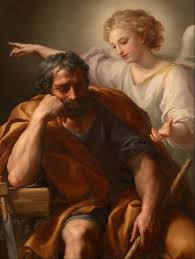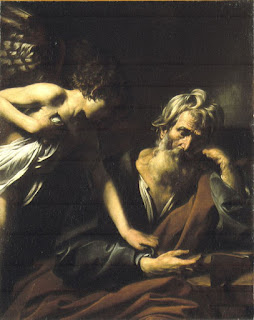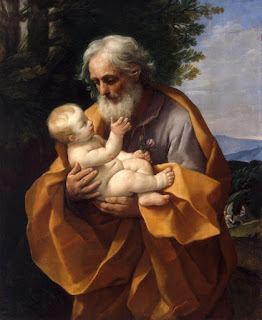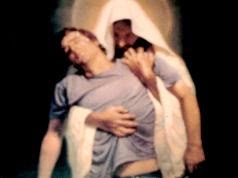 [[Dear Sister, you wrote recently about anointing as a prophetic sacrament and one which marks one's call or "commission" to be sick within the Church. How do you understand your own call to eremitical life? Do you feel called to be a prayer warrior or to teach Scripture? You were commissioned at your profession but what were you commissioned to do? Was it to pray? To do penance? Because you do some limited ministry in your parish do you see these things as part of your commissioning or mission? To what and to whom is the diocesan hermit sent?]]
[[Dear Sister, you wrote recently about anointing as a prophetic sacrament and one which marks one's call or "commission" to be sick within the Church. How do you understand your own call to eremitical life? Do you feel called to be a prayer warrior or to teach Scripture? You were commissioned at your profession but what were you commissioned to do? Was it to pray? To do penance? Because you do some limited ministry in your parish do you see these things as part of your commissioning or mission? To what and to whom is the diocesan hermit sent?]]
Thanks for your questions and observations. Because of a conversation I had with a hermit living back East (soon to be perpetually professed under canon 603!), I think I may have written about this in the past two or three years but I can't find the post so I'll just start over. In that conversation we talked about the hermit being sent, but not being sent out to teach or nurse or do pastoral ministry as a chaplain might, but rather, being sent into the hermitage. I want to enlarge on this idea; in doing so I will speak of the hermit's mission and the charism of her life which I identify as canon 603's "the silence of solitude".
 Three and a half years ago, as some readers will know, I began a process of focused personal formation with my Director. It was a process of spiritual formation, but also of personal healing (the healing of memories, of trauma associated with chronic illness, etc) and personal growth which supported my maturation as a theologian and hermit. The process was (and is) an intense one which demanded time taken from other things on my part and on the part of my Director as well. I remember saying to her, that the Church had professed me to live this vocation in her name and that if we discerned that this work was a piece of growing in this vocation then the Church had implicitly given me permission to undertake this work. I felt entirely free to undertake something which would demand time, energy, and certain limitations on writing, study, and limited ministry in my parish. What I did not say to Sister M (though I'm sure she knew this anyway) was that I thought this was actually part of the charism of an eremitical vocation, and part of what I was actually commissioned to undertake.
Three and a half years ago, as some readers will know, I began a process of focused personal formation with my Director. It was a process of spiritual formation, but also of personal healing (the healing of memories, of trauma associated with chronic illness, etc) and personal growth which supported my maturation as a theologian and hermit. The process was (and is) an intense one which demanded time taken from other things on my part and on the part of my Director as well. I remember saying to her, that the Church had professed me to live this vocation in her name and that if we discerned that this work was a piece of growing in this vocation then the Church had implicitly given me permission to undertake this work. I felt entirely free to undertake something which would demand time, energy, and certain limitations on writing, study, and limited ministry in my parish. What I did not say to Sister M (though I'm sure she knew this anyway) was that I thought this was actually part of the charism of an eremitical vocation, and part of what I was actually commissioned to undertake.
 So what is the hermit called to and what is the charism (unique gift quality) of her vocation? More, what is she commissioned or missioned to do/live? Most simply put I think, a hermit is called to witness to the fact that human beings are completed by God, that God alone is sufficient for us ("My grace is sufficient for you, my power is perfected in weakness."), and that union with God is the goal and fulfillment of human life. I am not commissioned to go out into the world and teach or preach or do retreats, or even spiritual direction, etc --- at least I am not primarily called to these things! Hermits are not sent out into the larger world but into the silence and physical solitude of the hermitage so that in that desert environment -- with, in, and through Christ -- we may let God be God and be made into and be the human beings God calls us to be. If we succeed in this, then our lives will witness to Paul's affirmation about the sufficiency of grace in 2 Cor 12:9 and we will be a source of hope to those who need it most --- those estranged from God, themselves, and others, those who believe their lives are worthless or empty of meaning, those who have nothing to recommend them in terms of the powers and values of this world and who feel unloved and lost.
So what is the hermit called to and what is the charism (unique gift quality) of her vocation? More, what is she commissioned or missioned to do/live? Most simply put I think, a hermit is called to witness to the fact that human beings are completed by God, that God alone is sufficient for us ("My grace is sufficient for you, my power is perfected in weakness."), and that union with God is the goal and fulfillment of human life. I am not commissioned to go out into the world and teach or preach or do retreats, or even spiritual direction, etc --- at least I am not primarily called to these things! Hermits are not sent out into the larger world but into the silence and physical solitude of the hermitage so that in that desert environment -- with, in, and through Christ -- we may let God be God and be made into and be the human beings God calls us to be. If we succeed in this, then our lives will witness to Paul's affirmation about the sufficiency of grace in 2 Cor 12:9 and we will be a source of hope to those who need it most --- those estranged from God, themselves, and others, those who believe their lives are worthless or empty of meaning, those who have nothing to recommend them in terms of the powers and values of this world and who feel unloved and lost.
God alone is sufficient for us. No one and nothing else is. We are made for a love which is greater than anything we might have known or imagined apart from God. We are called to a life which transcends the limits and horizons of this entire world/cosmos. We are precious beyond saying, treasures in earthen vessels who are completed by the God who made all we know and summons it to fulfillment in Him. The love of/by others prepares us for this infinite, transcendent love but cannot replace it. Again, God alone is sufficient for us. Hermits are sent into the narrow confines of their hermitage in order to witness to the fact that this limited space (and this limited human life!) opens up onto eternity in God. They give themselves over to God in prayer and penance, study, spiritual direction and similar personal formation and, in every way they can, say yes to being God's counterpart, God's covenant partner. During this Advent season we prepare ourselves for a God called Emmanuel, a God who promises to be with us -- a healing, sanctifying, comforting and empowering Love-in-Act who will allow nothing to separate us from Him (Rom 8). Hermits say (and have been commissioned to say with their lives) that indeed God IS with us!!
 The wholeness, peace, hope, and the cessation of all striving, fear, and anxiety in Christ, is what "the silence of solitude" refers to when it is seen as the goal of eremitical life. This "stillness" both leads to and is the result of eremitical solitude or communion with God. It is the essence of hesychasm. In a more immediate sense the silence of solitude is the environment of being alone with God, and in the more ultimate sense it is the gift (charism) which the hermit witnesses to/is for the whole church and world. We are each sent into the hermitage, a place of silence and solitude to allow God to make of us instances of "the silence of solitude" --- where solitude is defined in terms of wholeness and the fulfillment of individual truth/selfhood (holiness) in the Spirit of God. Each person is a language event -- the embodiment or expression of the Word of God spoken within them to others. Hermits are a particular kind of language event, a contemplative instance of what canon 603 calls "the silence of solitude", something formed in and ever so much richer than mere silence and solitude added together. The Church commissions her hermits to proclaim the Gospel to others in a way which allows them to hope in the promise of their own lives and look to God as the ground and source of all their truest potential and yearning.
The wholeness, peace, hope, and the cessation of all striving, fear, and anxiety in Christ, is what "the silence of solitude" refers to when it is seen as the goal of eremitical life. This "stillness" both leads to and is the result of eremitical solitude or communion with God. It is the essence of hesychasm. In a more immediate sense the silence of solitude is the environment of being alone with God, and in the more ultimate sense it is the gift (charism) which the hermit witnesses to/is for the whole church and world. We are each sent into the hermitage, a place of silence and solitude to allow God to make of us instances of "the silence of solitude" --- where solitude is defined in terms of wholeness and the fulfillment of individual truth/selfhood (holiness) in the Spirit of God. Each person is a language event -- the embodiment or expression of the Word of God spoken within them to others. Hermits are a particular kind of language event, a contemplative instance of what canon 603 calls "the silence of solitude", something formed in and ever so much richer than mere silence and solitude added together. The Church commissions her hermits to proclaim the Gospel to others in a way which allows them to hope in the promise of their own lives and look to God as the ground and source of all their truest potential and yearning.
Beyond this I personally do not feel called to be a prayer warrior --- though of course I pray for others and otherwise. I have written here in the past that the hermitage is a place where the hermit battles with demons, especially those of her own heart, so that God might be God exhaustively in space and time. However, the "warrior" description is something I personally dislike because it sounds too much like prayer is something I do rather than something God does within me. Because my education is in systematic theology with a foundation in Scripture I have discerned a call to do some Scripture/theology in my parish so the answer to this question is yes, I feel called to do this as well as spiritual direction and (perhaps) Communion Services once a week in our parish chapel on our pastor's day off. I also feel called to do this blog and to write more systematically re eremitical life, especially under canon 603. What seems clear to me is that these limited instances of apostolic ministry are the consequences of life in eremitical solitude. They come from it and they lead me back to it so that my prayer, study, lectio divina, and the work I do in personal formation become a direct gift to others. Let me be clear though: they could not function in this way unless they were expressions of who I am in Christ -- and so they lead me back to the hermitage cell where God and I speak, love, laugh, dance, sing, and cry together for the sake of the salvation of the whole cosmos.
 To whom or what is the hermit sent, then? The hermit is sent to her hermitage in order to be there for God's own sake, that God might be God. This is true so that others might know themselves as made for God and fulfilled by God alone. She is sent into the hermitage for God's own sake so that the true measure of her humanity may be achieved in Him and she may serve as a model for others. She lives from God in the solitary Christ so that others may know who God is, who we each are, and what God wants us and our world to be about. For this reason it is particularly important that hermits not be caricatures or stereotypes, and that their lives not be focused merely on their own salvation or perfection. Will they be perfected? Yes, but only as they give themselves over to God for God's own sake and the sake of a world in desparate need of God and all that God makes possible and dreams for us.
To whom or what is the hermit sent, then? The hermit is sent to her hermitage in order to be there for God's own sake, that God might be God. This is true so that others might know themselves as made for God and fulfilled by God alone. She is sent into the hermitage for God's own sake so that the true measure of her humanity may be achieved in Him and she may serve as a model for others. She lives from God in the solitary Christ so that others may know who God is, who we each are, and what God wants us and our world to be about. For this reason it is particularly important that hermits not be caricatures or stereotypes, and that their lives not be focused merely on their own salvation or perfection. Will they be perfected? Yes, but only as they give themselves over to God for God's own sake and the sake of a world in desparate need of God and all that God makes possible and dreams for us.





























































